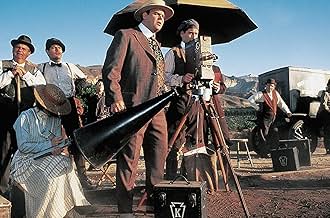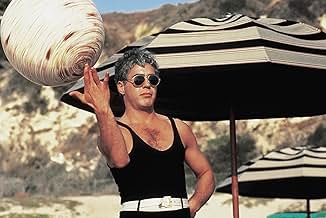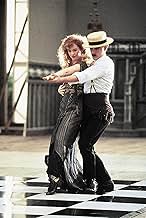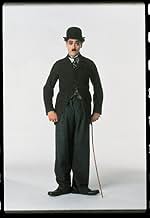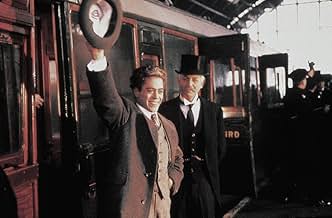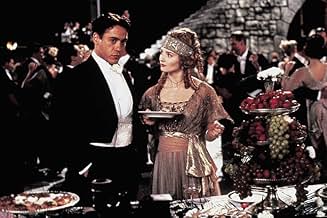Una película sobre la controvertida y difícil vida del máster de la comedia Charlie Chaplin.Una película sobre la controvertida y difícil vida del máster de la comedia Charlie Chaplin.Una película sobre la controvertida y difícil vida del máster de la comedia Charlie Chaplin.
- Dirección
- Guión
- Reparto principal
- Nominado para 3 premios Óscar
- 3 premios y 20 nominaciones en total
Deborah Moore
- Lita Grey
- (as Deborah Maria Moore)
Reseñas destacadas
The first thing one should know about "Chaplin" is that, paradoxically, very little of it has to do with Chaplin. Or, at least, it has more to do with the writers' illusions of him. The film claims to be based on "My Autobiography" and on "Chaplin: His Life and Art", by David Robinson. Having re-read the Autobiography before watching the film, it is clear to me that what the writers did was take basic incidents from the autobiography and embellish them with, I can only assume, parts of the Robinson book. What results is a series of scenes which were vaguely influenced by the facts, but so simplified and primitive that little of the original truth remains.
What the writers did not wish to acknowledge was that when Chaplin wrote vaguely or skimmed past certain parts of his life, he really didn't want anyone to delve into them - and the filmmakers did just that. "Chaplin" is not really about Charlie Chaplin, his work and films. It is simply ceaseless speculation on his personal life, but going on even more vaguely about it than the Autobiography.
I am well aware that almost every biopic focuses more on the personal life of a person than on their work. The problem is that most of the characters in "Chaplin" are so exaggerated and simplified that they become almost completely unbelievable - both as the real people AND as fictional characters. None of them are fully developed. This is not entirely the fault of the supporting cast (although it really is not that interesting): the fault lies with the screenplay, which is too often bland and melodramatic. This is especially obvious in the ridiculous subplot concerning the older Chaplin and his editor, which is the most pointless and badly done part of the film; even Hopkins cannot make the lines sound credible, which is all the proof anyone needs of their mediocrity. The film would have worked immeasurably better without these additions.
Many of the most interesting aspects and parts of Chaplin's life are completely ignored, oddly, with seemingly irrelevant or less important stories added in for little reason. One scene in particular is added only to insert a Chaplin-esquire physical comedy sequence which falls flat. The writers greatly accentuated everything to do with Hetty Kelly, even making the same actress play Oona O'Neill; the tried too hard to give him some kind of motive for his relationships, which only leads to more bias and speculation; and although I am by no means a Chaplin purist or even a very knowledgeable admirer, the blatant alterations on the actual history grated on my nerves.
All this being said, the film is certainly not a terrible one. Mainly, however, this is for one reason only, and that is - yes - Robert Downey Jr. himself. The praise he received for the role is by no means undeserved. As Chaplin he is perfect, managing to make the best out of his rather predictable lines, remaining interesting, believable, and in many parts moving. He has wonderful timing and intensity, and even looks the part (he could even do the roll dance). I really quite believed he was Chaplin. Even his performance, however, suffers greatly because of the lines - and the flash-forwards. I have no doubt that he could have played an even better Charlie Chaplin in a differently made film.
The greatest scene in "Chaplin", I think, is the opening credits: Charlie arrives in his dressing room, alone, sits, and begins to remove his make-up. The scene is in black and white, and there is no dialogue - only music. Every emotion is expressed simply through his eyes. If the rest of the film had been made like this, I actually think it could have been perfect. Either way, the lead performance is astounding, the music is beautiful, and though not very insightful or too true to history, this film is well worth watching.
What the writers did not wish to acknowledge was that when Chaplin wrote vaguely or skimmed past certain parts of his life, he really didn't want anyone to delve into them - and the filmmakers did just that. "Chaplin" is not really about Charlie Chaplin, his work and films. It is simply ceaseless speculation on his personal life, but going on even more vaguely about it than the Autobiography.
I am well aware that almost every biopic focuses more on the personal life of a person than on their work. The problem is that most of the characters in "Chaplin" are so exaggerated and simplified that they become almost completely unbelievable - both as the real people AND as fictional characters. None of them are fully developed. This is not entirely the fault of the supporting cast (although it really is not that interesting): the fault lies with the screenplay, which is too often bland and melodramatic. This is especially obvious in the ridiculous subplot concerning the older Chaplin and his editor, which is the most pointless and badly done part of the film; even Hopkins cannot make the lines sound credible, which is all the proof anyone needs of their mediocrity. The film would have worked immeasurably better without these additions.
Many of the most interesting aspects and parts of Chaplin's life are completely ignored, oddly, with seemingly irrelevant or less important stories added in for little reason. One scene in particular is added only to insert a Chaplin-esquire physical comedy sequence which falls flat. The writers greatly accentuated everything to do with Hetty Kelly, even making the same actress play Oona O'Neill; the tried too hard to give him some kind of motive for his relationships, which only leads to more bias and speculation; and although I am by no means a Chaplin purist or even a very knowledgeable admirer, the blatant alterations on the actual history grated on my nerves.
All this being said, the film is certainly not a terrible one. Mainly, however, this is for one reason only, and that is - yes - Robert Downey Jr. himself. The praise he received for the role is by no means undeserved. As Chaplin he is perfect, managing to make the best out of his rather predictable lines, remaining interesting, believable, and in many parts moving. He has wonderful timing and intensity, and even looks the part (he could even do the roll dance). I really quite believed he was Chaplin. Even his performance, however, suffers greatly because of the lines - and the flash-forwards. I have no doubt that he could have played an even better Charlie Chaplin in a differently made film.
The greatest scene in "Chaplin", I think, is the opening credits: Charlie arrives in his dressing room, alone, sits, and begins to remove his make-up. The scene is in black and white, and there is no dialogue - only music. Every emotion is expressed simply through his eyes. If the rest of the film had been made like this, I actually think it could have been perfect. Either way, the lead performance is astounding, the music is beautiful, and though not very insightful or too true to history, this film is well worth watching.
An attempt to make a film that is both honest and at the same time shamelessly self-serving about its (auto)biographical subject -- the legendary comedian/director Chaplin -- is pulled off with style. It's fun to see some modern talents inhabit the roles of screen's bygone icons (though in some cases a little less charicature would have been appreciated, especially in the case of Mabel Normand). Kline, surprisingly enough, makes a convincing Fairbanks. The rest of the cast is also well-picked -- X-Files fans should watch closely to catch quite a few glimpses of lower-billed David Duchovny as Chaplin's personal editor.
The direction is very good; I particularly liked how some of the straight scenes were filmed in a comic, surrealist style (Chaplin's escape from the police w/ his cans of "the Kid" reels is staged like a Keystone Komedy), while some of what might have been more comic elements are played straight (Chaplin's attempt to convince his brother that "The Tramp" cannot talk in a movie is both funny and serious, for example). Some of the (perhaps true to life) melodramatic elements are a bit overplayed (the bit with his mom was handled too heavily for my tastes, especially her shouting his name as she's dragged away by the asylum guards), but generally the film avoids genre cliches and "easy" scenes.
Great photography.
Downey Jr. fits the roll well, even rising to many of the physical challenges of the Chaplin mystique.
A superior film of its type, laced with self-conscious humor and self-reflection on the artistic temperament.
The direction is very good; I particularly liked how some of the straight scenes were filmed in a comic, surrealist style (Chaplin's escape from the police w/ his cans of "the Kid" reels is staged like a Keystone Komedy), while some of what might have been more comic elements are played straight (Chaplin's attempt to convince his brother that "The Tramp" cannot talk in a movie is both funny and serious, for example). Some of the (perhaps true to life) melodramatic elements are a bit overplayed (the bit with his mom was handled too heavily for my tastes, especially her shouting his name as she's dragged away by the asylum guards), but generally the film avoids genre cliches and "easy" scenes.
Great photography.
Downey Jr. fits the roll well, even rising to many of the physical challenges of the Chaplin mystique.
A superior film of its type, laced with self-conscious humor and self-reflection on the artistic temperament.
A film about the troubled and controversial life of the master comedy filmmaker Charles Chaplin.
What can I say? This was a really good film. It touched on all the highlights of Chaplin's career, both high and low. And even with the lengthy run time, I feel like it could have been even longer. It had such a great pace and was enjoyable to watch. And the cast. Wow. Milla Jovovich before she blew up? Diane Lane? Very good casting.
Robert Downey Jr nailed it. He has the look, he did the physical comedy, and that had to take a lot of training... the drunk routine, wow! I am so glad that Downey is back on top these days with "Iron Man" and other films. He had a rough patch for a while, but he is far better of an actor than he is generally given credit for.
What can I say? This was a really good film. It touched on all the highlights of Chaplin's career, both high and low. And even with the lengthy run time, I feel like it could have been even longer. It had such a great pace and was enjoyable to watch. And the cast. Wow. Milla Jovovich before she blew up? Diane Lane? Very good casting.
Robert Downey Jr nailed it. He has the look, he did the physical comedy, and that had to take a lot of training... the drunk routine, wow! I am so glad that Downey is back on top these days with "Iron Man" and other films. He had a rough patch for a while, but he is far better of an actor than he is generally given credit for.
This is a great example of a movie I took a chance on one rainy Sunday at a theater in Charlotte, NC., and was highly rewarded with an intriguing look at the life of an early film star set against the background of early Hollywood. I had't heard much buzz about it and didn't really know much about Charlie Chaplin. Downey is amazing in his personification of Chaplin. If you want to expand your horizons and learn a little about the inside workings of the film industry from circa World War I thru the 50's, this award-winning movie comes highly recommended.
Chaplin isn't really a great bio-pic, but there are moments when Richard Attenborough's direction shines and it's consistently got an amazing Robert Downey Jr. performance as the title character. In fact, this is the kind of movie where the lead actor is so important that some of the major enjoyment and success of the film rests on him/her, oddly enough since it is a varied and superlative ensemble. There are moments when Attenborough's grandiosity gets in the way, and the moments that mark it as being somewhat conventional. What made me pleasantly surprised is what Attenborough *did* decide to show with Chaplin the private man; I thought that he would cut out much of the stuff with Chaplin's penchant for young (usually underage) girls, or some of the things regarding his mother, but most of the notorious facts are put in for good measure to counter-balance some of the pompous, though fascinating, scenes of "cinematic history."
Now as a fan of Chaplin's films and the given acknowledgment that he's one of the most talented comic actors and filmmakers of the 20th century, I do get a little choked up seeing that final clip-show at the Oscars of great clips from his most famous movies. And it's interesting always, from just a movie-buff stand-point, to watch the history behind Chaplin's transition from vaudeville to Max Senett's film company to slowly becoming an independent and world-famous auteur/star. But for the most part the writing and the direction make it entertaining just on that conventional, rise-fall-rise-fall-struggle-success-at-end story with maybe less drugs and a bit more politics than one might usually see (save for one fantastic scene when Chaplin and his brother and friends are sneaking around the film footage of The Kid from the brass who want it for tax purposes).
What makes it almost outstanding, however, is Downey Jr. He's funny as Chaplin when he needs to show how he was a great clown (i.e. the 'old-drunk' bit), he's melancholy when needed, he plays Chaplin as young, middle-aged, and old perfectly, and there's just the slightest details that keep you glued to the screen to see what he'll do next. It's not exactly a breakthrough role as he'd been doing some really good work intermittently in the late 80s, but this is the one that got him recognition by the likes of the Academy, and rightfully so. It's masterful work in a decent tribute to Sir Charles "Tramp" Chaplin, and should delight those looking for a good ensemble and a commanding lead performance.
Now as a fan of Chaplin's films and the given acknowledgment that he's one of the most talented comic actors and filmmakers of the 20th century, I do get a little choked up seeing that final clip-show at the Oscars of great clips from his most famous movies. And it's interesting always, from just a movie-buff stand-point, to watch the history behind Chaplin's transition from vaudeville to Max Senett's film company to slowly becoming an independent and world-famous auteur/star. But for the most part the writing and the direction make it entertaining just on that conventional, rise-fall-rise-fall-struggle-success-at-end story with maybe less drugs and a bit more politics than one might usually see (save for one fantastic scene when Chaplin and his brother and friends are sneaking around the film footage of The Kid from the brass who want it for tax purposes).
What makes it almost outstanding, however, is Downey Jr. He's funny as Chaplin when he needs to show how he was a great clown (i.e. the 'old-drunk' bit), he's melancholy when needed, he plays Chaplin as young, middle-aged, and old perfectly, and there's just the slightest details that keep you glued to the screen to see what he'll do next. It's not exactly a breakthrough role as he'd been doing some really good work intermittently in the late 80s, but this is the one that got him recognition by the likes of the Academy, and rightfully so. It's masterful work in a decent tribute to Sir Charles "Tramp" Chaplin, and should delight those looking for a good ensemble and a commanding lead performance.
¿Sabías que...?
- CuriosidadesGeraldine Chaplin played her real-life paternal grandmother Hannah Chaplin.
- PifiasWhen Charlie is shown at the 1972 Oscars near the end of the movie, he is showed being brought to the podium in the wheelchair and then standing at the podium as the movie clips played. In the actual awards ceremony, Charlie walked out to the podium under his own power after the clips ended.
- Citas
German Diplomat: [offering his hand] Mr. Chaplin! I am a great admirer of yours.
Charlie Chaplin: I'm sorry, I prefer not to shake hands with Nazis.
German Diplomat: [laughs nervously] What have you got against us, Mr. Chaplin, hm?
Charlie Chaplin: What have you got against everybody else?
- Créditos adicionalesThe film ends with the final scene of El circo (1928): Charlie Chaplin walks off into the distance.
- Versiones alternativasTo receive a 12 certificate the original UK cinema version was cut to remove one use of 'fucking' (during Charlie's homecoming visit to a pub). Later releases were uncut and upgraded to a 15 rating.
- ConexionesFeatured in Friday Night: Episodio #1.11 (1992)
- Banda sonoraThe Honeysuckle and The Bee
Written by Albert Fitz and William H. Penn (as William Penn)
Selecciones populares
Inicia sesión para calificar y añadir a tu lista para recibir recomendaciones personalizadas
- How long is Chaplin?Con tecnología de Alexa
Detalles
Taquilla
- Presupuesto
- 31.000.000 US$ (estimación)
- Recaudación en Estados Unidos y Canadá
- 9.493.259 US$
- Fin de semana de estreno en EE. UU. y Canadá
- 84.669 US$
- 27 dic 1992
- Recaudación en todo el mundo
- 9.493.259 US$
- Duración2 horas 23 minutos
- Color
- Relación de aspecto
- 1.85 : 1
Contribuir a esta página
Sugerir un cambio o añadir el contenido que falta




